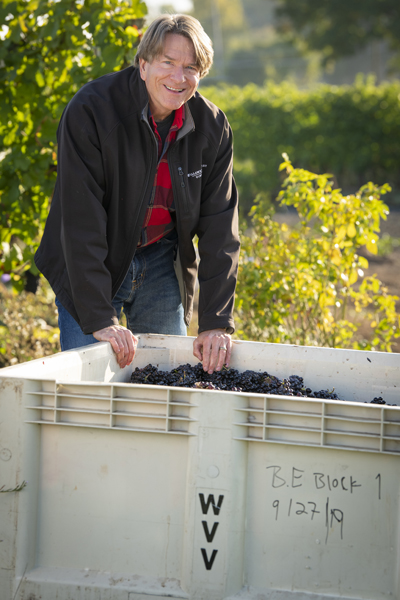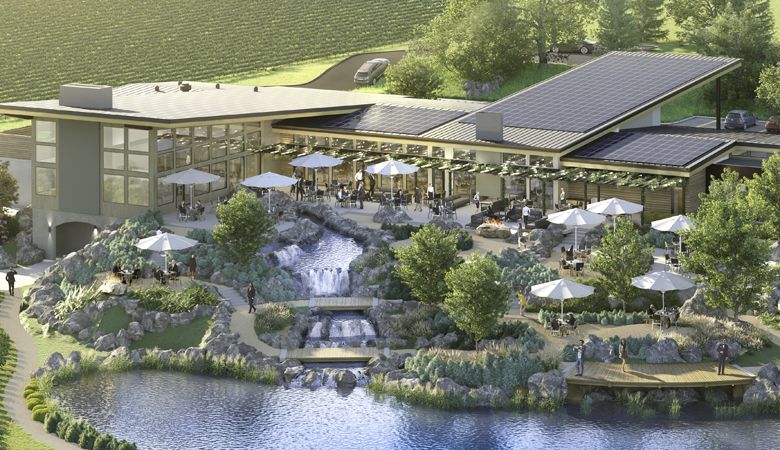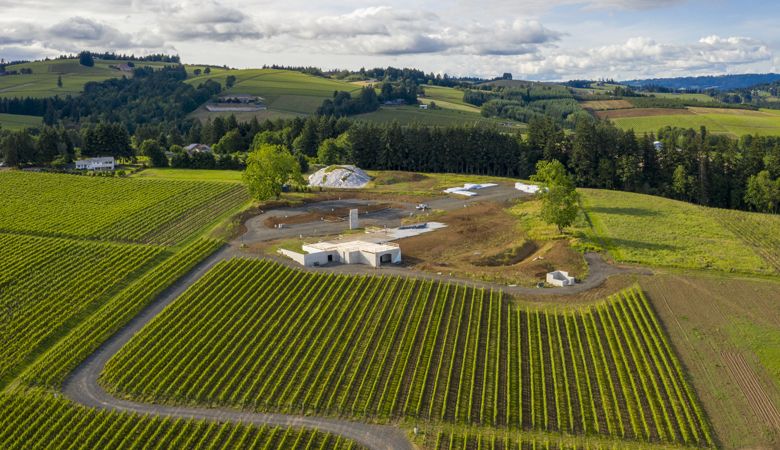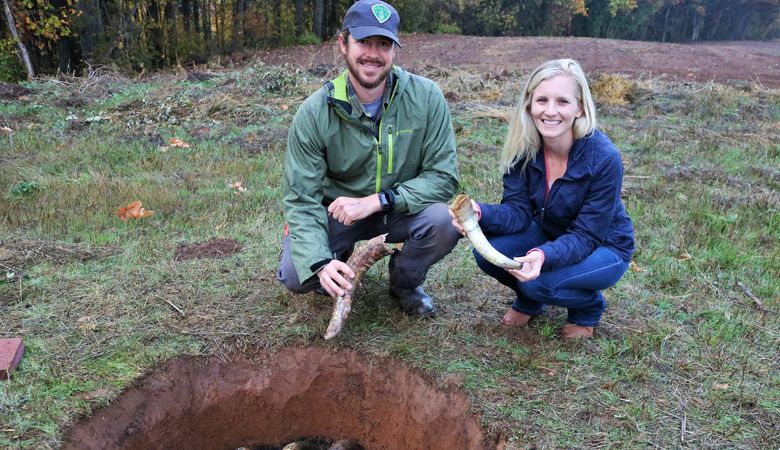Stocking Up on Bubbles
Willamette Valley Vineyards raises funds for Dundee Hills facility
Jim Bernau of Willamette Valley Vineyards never ceases to amaze. Over the past 36 years, he has built an Oregon wine empire through public stock offerings, and it appears his approach will once again augment the size and scope of his current operation. This time it’s to create a new facility — with a unique twist — already beginning to take shape on the lower slopes of the Dundee Hills.
This exciting project has involved the intersection of several elements, one of which made the entire idea feasible in the first place. But before that story unfolds, a prologue would be appropriate.
For more than two decades, a small but stylishly designed winery has stood alongside 99W at the western end of the Dundee Hills. Surrounded on three sides by mature vines, it was perfectly positioned to process those grapes, but the winery placement proved to be a major problem. State highway planning regulations, in regard to adequate access, had not been correctly followed when the building was constructed.
Unable to open a tasting room on the heavily traveled tourist route, the owner’s otherwise ideal asset turned into an almost insurmountable liability. In 2004, the wayward winery and 15 acres of vines were sold to Herb and Eleanor Sims; they had moved to Oregon the year before.

Already owners of a vineyard in Central Otago, New Zealand, the Sims founded Barrel Fence Cellars in the Dundee Hills, where they crafted wines from both hemispheres and sold them at their Worden Hill Road tasting room. As for the building on 99W, the Sims made and stored some of their wine there, but from the highway, the small structure appeared abandoned most of the year.
In 2016, the couple retired. About the same time, Bernau started looking for property ideal for sparkling production. Willamette Valley Vineyard’s winery director, Christine Clair, met with the Sims, and Bernau made a deal at the beginning of 2017. And yet, the problem of denied access by ODOT continued, curtailing further activity. Few outside the industry even knew Willamette Valley had purchased the place.
In late 2019, excavation began adjacent to the structure’s eastern side — locals took notice but still no clue as to who or what. Then, the COVID-19 pandemic began, and work skidded to a standstill. Now, with summer’s arrival and work resuming, the curious need wait no longer. Three years in the making, a grand plan is being revealed to the public. Happily, it incorporates the neglected little winery.
Growing Willamette Valley Vineyards into one of the state’s largest brands; expanding its estate vineyards to 412 acres and total vineyard resources to 704 acres; and pursuing the purchase of property in every Oregon AVA apparently hasn’t yet filled Bernau’s plate. There’s more room.
The soon-to-be facility, Bernau Estate in the Dundee Hills, will be home to a sparkling wine operation crafting top-quality sparkling wines made in the méthode Champenoise style from Dundee Hills Pinot Noir, Chardonnay and Pinot Meunier grapes. From this full slate of classic varieties, will emerge the tradition-honored portfolio of offerings: brut, brut rosé, blanc de blancs, blanc de noir and extended tirage.
The original 15 acres of now 26-year-old vines currently comprises the estate vineyard acreage. Another 15 acres are being added. As planned, fruit for Bernau Estate sparkling wines will come entirely from these 30 acres.
Previously, no Oregon winery of size, other than Argyle, has placed major, if not total, emphasis on sparkling production. Many have dabbled, some with quite impressive results, but the commitment to consistently produce thousands of cases annually requires a lot of capital and talent, too.
Fortunately, Willamette Valley Vineyards has already secured a consulting sparkling winemaker, Andrew Davis, to work with head winemaker Joe Ibrahim. Over the last several years, Davis’ Radiant Sparkling Wine Company has afforded Willamette Valley wineries the opportunity to bust into the bubbly biz on their feet and at least jogging — if not running. He supplies the specialized equipment and the expertise most producers don’t have to get a viable sparkling program underway.
Several wineries have and continue to benefit from the company’s services, which helped make sparkling under the Willamette Valley Vineyards label in 2014, 2015 and 2016. Soon to be released, the 2017s will bear the Bernau Estate label for the first time.
Yet, the challenges set by Jim Bernau for this new venture far exceed anything Davis has accomplished before. Overriding all else remains the mandate that the wines be produced under the most demanding eco-centric regimen on the planet: Biodynamics. Strictly adhering to its strenuously specific practices, an inventory is being built up so product will be ready to sell when the doors open.
Until then, construction continues on the impressive structure. The fermentation cellar is designed to process up to 12,000 gallons. An underground aging cellar will hold some 3,000 cases. A tasting room and commercial kitchen will comprise the interior of the sleekly modern 19,000-square-foot building. Solar panels will occupy most of the roof.
An admirable undertaking in its own right, with a $13.5 million budget, the estate is much more than a state-of-the-art sparkling winery; the property will be an enological and ecological experience, including an outdoor garden environment meant to educate guests on the holistic principles behind Biodynamics. These lush gardens — interconnected by pathways, wooden walking bridges and water features replicating fast-flowing streams feeding rushing waterfalls — as well as the building and surrounding vines will be integrated into a harmonious whole.
Bernau is proceeding in the quest for Demeter certification — currently, only 12 Oregon wineries have achieved this gold standard of Biodynamics around the world.
In 2017, the entrepreneurial owner conducted a successful preferred stock offering to begin work on the Dundee Hills project. It attracted 1,000 new “wine enthusiast” owners into the 16,000-strong Willamette Valley Vineyards fold. A three-year negotiation to secure approval from ODOT for access from Highway 99W onto the property has finally come through, and now it’s time to take the next step.
The winery wants to complete the funding of Bernau Estate, seeking to raise $9.3 million. On July 8, 2020, a preferred stock offering of $4.85 a share was listed on the NASDAQ composite index. The price will increase to $4.95 after Sept. 20. Annual dividend will be 4.5%, which may be converted into a wine credit worth 15% more. Minimum investment is 350 shares at $1,695 and maximum investment is 2,300 shares at $11,155. As of July 10, $1,090,000 in subscription agreements had been received.
Interested wine enthusiasts may read more at www.wvv.com/ownership or call 503-588-9463.













